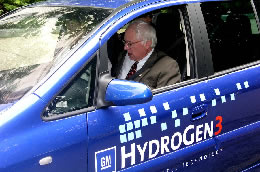|
Newsflash! The Energy Department announced yesterday it is planning to change its strategy for developing alternative sources of energy. Instead of continuing efforts on solar, thermal and wind power, it will instead focus on "Sheer Energy" pantyhose technology.
OK, let's get serious now. Occasionally the news focuses on energy issues, and sometimes we hear people saying things like, "There's practically no relationship between our energy policy for electricity generation and our oil policy." Is that true? And who cares, anyway? We all should care, and we'll explain why. But first some facts.
Coal, natural gas, and nuclear are the main sources of electricity generation, together accounting for 88% of all electricity generation in the United States. Oil-fired power plants accounting for only 2% of electricity generation. (The remaining 10% comes mostly from hydroelectric and other renewable sources.)
Cars, SUVs, and trucks, on the other hand, are almost completely powered by oil-based fuels, primarily gasoline and diesel.
 Buses are increasingly being powered by natural gas or propane, and non-oil fuels such as ethanol, methanol, and vegetable oil are starting to be used in a variety of vehicles, but for the most part, our thirsty fleet drinks oil.
Buses are increasingly being powered by natural gas or propane, and non-oil fuels such as ethanol, methanol, and vegetable oil are starting to be used in a variety of vehicles, but for the most part, our thirsty fleet drinks oil.
So, is it wrong-headed to bother talking about adding renewable energies such as wind, solar, and wave power to our electricity mix when we're trying to figure out how to end our vehicles' oil addiction, particularly our dependence on foreign oil? In the short term, that's pretty much the case; but in the long term, electricity-generation technologies will be very relevant to the fuel we put in our vehicles.
According to most energy sages, hydrogen-powered cars will be what most of us are tooling around in several decades from now. But you don't just drill in the ground and pump out hydrogen; it has to be extracted from another source.
Hydrogen is the most abundant element in the universe and is found in many, many different molecules. Thus, it can theoretically be extracted from a wide variety of sources. But the favored sources, at least for now, are:
- water;
- natural gas, particularly methane;
- coal, via coal gasification; and
- biomass (vegetation such as wood chips and agricultural waste).

SOURCE: NREL
The processes for extracting hydrogen from these sources are different, particularly in the case of water. To get hydrogen gas out of water, electrolysis is used—that is, electricity is employed to strip the hydrogen molecules out of the water. Comparatively, in the case of natural gas, a "reforming" process is used.
However, no matter what the source of the hydrogen, the process requires electricity and/or other types of energy. Additionally, in the cases where fossil fuels or biomass are used as the sources, the substrates are power-plant fuels themselves, which sets up a sort of competition between using them for generating electric power and generating hydrogen.
If we fast-forward 30 years to the "hydrogen future car," we see that vast amount of hydrogen must be generated for our vehicles. That will require electricity as an input. At the same time, an expanding population will be demanding more electricity for homes and offices and will be driving more vehicle miles; all while pollution and hazardous waste problems continue to dictate that we reduce the use of fossil fuels and nuclear power for generating electricity.
The message here is clear: to keep our vehicles rolling, our homes and offices humming, and the air clean enough to breathe, we will need to get behind clean, renewable electric-generation technologies—big time. And given the development cycle of such large-scale technological changes, we need to start sooner rather than later.
Remember that our future electricity generation requirements will be the sum of what we use for homes, offices and industry AND what we will need to "refine" our vehicle fuel. In the US, we have plenty of coal and uranium, and we certainly COULD build more nuclear and coal power plants to address those power requirements. But each of those energy sources has serious environmental,
 health, and safety drawbacks. (Would you want either type of power plant in your back yard?) The alternative is to start to REALLY invest in solar, wind, wave, and other forms of clean, renewable energy technologies.
health, and safety drawbacks. (Would you want either type of power plant in your back yard?) The alternative is to start to REALLY invest in solar, wind, wave, and other forms of clean, renewable energy technologies.
Hydrogen-fuel technology will develop over time, and when it finally matures in a way that gives us zero-emission, foreign-oil-free vehicles, we need to make sure that we have the electrical-generation capacity needed to power the fleet. But we also need to make sure that we haven't cleaned up our cars by employing more of today's dirty electricity-generation technologies.
Now we see that there does exist an intersection between long-term energy policies for vehicle fuels and electricity generation. In the nearer term, how do we reduce our dependency on foreign oil and avoid the entanglements that come with it? The US simply does not have the oil reserves to drill its way out of the problem, especially with oil-consumption rates continuing to increase.
The only way out is to reduce oil consumption by improving the fuel economy of the fleet and by encouraging reductions in average miles driven by supporting smartly
 designed communities. When it comes to improving mileage, don't think that means everyone has to drive a Yugo. Significant mileage improvements can be achieved without sacrificing comfort and capacity by using hybrid technologies and other applicable, existing technologies, such as low-resistance tires, advanced engines, improved transmissions, drag reduction techniques, weight-saving measures, and improved exhaust control equipment.
designed communities. When it comes to improving mileage, don't think that means everyone has to drive a Yugo. Significant mileage improvements can be achieved without sacrificing comfort and capacity by using hybrid technologies and other applicable, existing technologies, such as low-resistance tires, advanced engines, improved transmissions, drag reduction techniques, weight-saving measures, and improved exhaust control equipment.
Reducing oil use in both the short run and the long term will clean up our air, land, and water and enhance our national security. We can get there, as long as we have smart political leadership. (Hey—is that an oxymoron?) Our leaders must recognize that different strategies are required for the two timeframes.
So, while we all dream of the year 2030 and what color racing stripes we'll have on our supercharged, hydrogen-fueled sportsters or SUVs, let's start moving policies related to fuel consumption and electricity generation in directions that will get us there.
More articles and resources on....
Get Grinning Planet free via email
|


